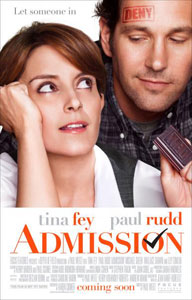 For a guy whose college essay was about being an underachiever, director Paul Weitz really came out on top. He’s got credits like “American Pie,” “In Good Company,” “About a Boy,” and more to his name and, with his latest film, “Admission,” Weitz could strike the ideal union of a modestly scaled production with a very wide appeal.
For a guy whose college essay was about being an underachiever, director Paul Weitz really came out on top. He’s got credits like “American Pie,” “In Good Company,” “About a Boy,” and more to his name and, with his latest film, “Admission,” Weitz could strike the ideal union of a modestly scaled production with a very wide appeal.
“Admission” will strike a chord with anyone who’s gone through or plans to go through the college admission process. It stars Tina Fey as Portia Nathan, a Princeton admissions officer dedicated to the institution’s strict standards. When the opportunity for a promotion arises, Portia is determined to get the gig. However, when she attempts to impress her superior by expanding her annual recruiting trip by visiting an alternative high school, she’s forced to recognize that there may be bright young minds outside of Princeton’s cookie cutter idea of the ideal prospective student.
In honor of “Admission’s” Friday, March 22nd debut, Weitz took the time to sit down and talk all things college admissions. He dished on his own experience applying to college and the trajectory he’s got in mind for his kids. Weitz also delved into the challenge of meeting audience expectations while also exceeding them, working with his ideal cast, and more. Check it all out for yourself in the interview below.
What was it about this script that made you think this was the movie for you?
Paul Weitz: It wasn’t the script. The process was read the book, meet with [screenwriter] Karen Croner who I’d known for a while. I was directing something and so she went off and did a really great job on the first shot at the script. But, even before that, I read it and the cruel, x-ray version of it I thought would make an interesting movie. This woman who’s activity decided to not be a parent who has set up this life where she’s judging kids who’s then thrown into this situation where she’s completely unbalanced, I thought that would make a cool movie. But I had to make a bunch of decisions about how to adapt the novel, so Karen and I worked on the plot and then we went to New York and pitched it beat by beat to Tina because I knew if there were certain things that I was doing that she wasn’t gonna be into, there was no point because I really felt like the movie was specific to her in a similar way to how I felt when my brother and I approached Hugh Grant about “About a Boy.” We couldn’t quite imagine anybody else doing that role, so is she hadn’t wanted to do it and wanted to do it in the way that I was talking about, I wouldn’t have done the movie.
And all that happened before a script was even written?
It was really off the plot. There wasn’t much point to going ahead with the script unless we knew that Tina was game for doing things this way.
So you never had a #2? It was always Tina or nothing?
Yeah, basically. I felt like this role of somebody who is smart enough for you to believe that she is justifying her decisions in life and that she’s smart enough to hide her deficiencies from herself was perfect for Tina.

For you personally, did you ever go through a nightmarish college admission process?
[Laughs] It wasn’t a nightmare. Actually, in high school, I lived in New York in an apartment building and I had to deal with the doormen of the apartment building that, when my report cards would arrive, I would have them hold them for me before my parents saw them. I would actually doctor my report cards before my parents could see them. My high school had a thing where the college guidance counselor would meet with your parents before figuring out where to apply and it was a really funny meeting because my dad thought that I had these incredible grades and could pretty much go anywhere I wanted, and the guidance counselor was like, ‘Um, sorry.’ [Laughs] And I knew what the disconnect was and I wasn’t saying it. So it was a really funny meeting, but I ended up having a really good college experience. I guess I was lucky I wasn’t able to go to certain places my parents would have wanted me to go.
Do you remember what your college essay was about?
Yeah, it was about being an underachiever. [Laughs]
[Laughs] That’s funny; mine was about running for student government and never winning. Maybe there’s something to the underachiever angle.
Yeah! That’s good! That’s a good take on it!
And how about your own kids? After going through the process yourself and making this movie, does that influence where you’ll push them?
Yeah, I think the thing is you can push your kids in whatever direction, but their true nature’s gonna pop to the surface anyway. It’s like a bath toy you’re trying to keep under the water, so you’ve got to watch it because kids often want to please their parents or rebel against them. I grew up in New York and I feel like the kids I graduated with all had big advantages educationally, but some of them wound up being happy and some of them ended up being miserable, and there didn’t seem to be any correlation to the fact that they got into a place in the city that was an elitist institution. So I try to keep that in mind more than anything else. And in terms of schools, my wife and I, we have a nine-year-old, a six-year-old, and a two-year-old, and we seem to only be drawn to schools where if you show up, you can get in. I’m not into competing to get my kid into a school. There’s something heinous about it, I think.
It’s funny; that makes me think about “Little Fockers,” too.
Yeah. That’s funny. I hadn’t thought about that.

Speaking of that, can you tell me about the challenges of making a commercial comedy? How do you manage what you want to do with the required expectations?
This movie was a low budget movie and I like that because I feel freedom. The most commercial movie I ever made, evidently, was “American Pie” [laughs], but nobody knew what that was gonna be and the people at the studio, apparently they called it “Quaalude High” internally because they felt like everybody was acting really badly in it, and they didn’t know what we were doing. [Laughs] I think it’s hard to tell what’s gonna be commercial, but the higher your budget, the more pressure you have to give over control to what the studio sees as the audience. I was happy that we were all game for doing this in a roughly low budget fashion. Having said that, I do think that this is not a particularly obscure film emotionally, and it’s a comedy with three really great comedians, so I’d be delighted if people went to see it.
How about those audience expectations? People see a poster with Tina Fey and Paul Rudd and they’re expecting to get something very specific, but then you also have to take it a step further and give them something unexpected, too. Is there any pressure that comes with that?
I don’t feel the pressure because I’m like a village idiot; I’m just doing my thing. [Laughs] Going back to when my brother and I wrote the movie “Antz,” an animated film with Woody Allen playing a neurotic ant, and we worked on it for two and a half years before it came out, and I remember going to the theater on the first day and there was a little five-year-old kid pointing at the poster, jumping up and down, yelling, ‘Antz,’ and I had this ‘oh, sh*t’ moment where I realized that this was a movie for kids, and I’d completely forgotten about it. [Laughs] I think it’s a massive trap to try to meet audience expectations because you can really ruin a piece because you don’t know what they’re expecting. You rapidly find out when you do a test screening that people both want you to deliver on the premise and, at the same time, they get very annoyed if it’s exactly what they think it’s gonna be. I don’t know where the thin borderline is between those two things, but it seems like the way to walk that bored is to not think about it.
Does negative feedback affect you?
It affects me in the way that my mind goes to, ‘Oh, sh*t. I hope I get to keep making films.’ Sometimes I read stuff. Often I don’t because it can make you dreadfully self-conscious. Usually, what I try to do is, whenever I have something that appears to have failed, I try to get to work the next morning and use it like I’m in a fight, so if you get hit, you’ve got to dodge around and keep on coming. It’s a weird thing because you have this delusion that you can control certain things. Also, I have my own sort of report card for the films that I’ve done, and some of the films that didn’t do well are things I gave myself a good grade on, like “American Dreams,” and maybe some of the stuff that did better, they don’t mean more to me necessarily.

Is there anything in “Admission” you’re particularly proud of?
I feel like one of the exciting things about directing is that each of the actors, if they’re good, has an utterly different approach to their craft and so part of the challenge is getting them all to be in the same movie, and I feel like everybody was in the same movie. I’m proud to have worked with Tina and Paul. Actually, Paul is really good at scanning a script and telling what the whole story’s going to be and whether you’re telling the story accurately. I’m really happy to have worked with Lily Tomlin. That’s very exciting to me because I love “Nashville,” I love the work she did with Robert Altman. The last few films I did I was kind of viewing as all part of one big burst of work, and I’ve done a couple plays in the last four years as well, so I’m really happy to be in a terrain that’s probably similar to some stuff I’ve done earlier like a film called “In Good Company” or “About a Boy.” I feel good. I feel good about the film.
